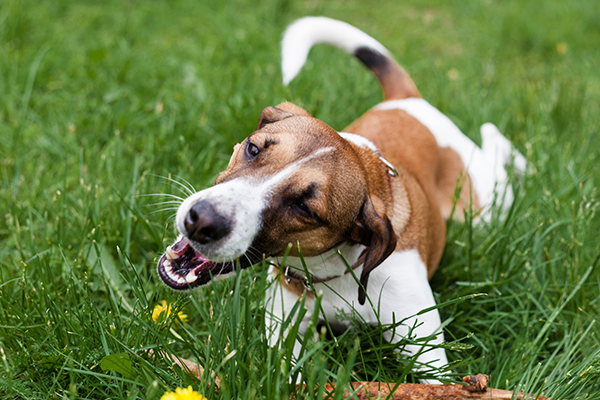Is It OK To Let Pets Eat Grass?

Eating grass might seem gross to us, but it’s irresistible for many cats and dogs. As pets chomp down on clumps of grass, many pet owners wonder whether it’s okay to just let them enjoy it. Is it safe? Can they digest it? Does it mean they have a vitamin deficiency?
One thing is for sure: grass makes pets throw up. This is the main reason people ask their vets for advice. It just doesn’t seem normal for a pet to eat something and vomit, over and over.
Surprise! It’s perfectly normal. Mention it to your vet if you’re concerned, but it’s probably fine to let your pet nibble. Here are some reasons they’re doing it, and how to know if something is truly out of the ordinary.
Indigestion
When your pet has a bit of indigestion, it can be a confusing and uncomfortable feeling for them. They’re not sure what do about it. If grass is nearby, they’ll instinctively chew on it for the relief it brings.
When your pet chews - grass, food, anything - it stimulates the salivary glands and other parts of the digestive tract. If something was stuck, it might start moving. Grass also acts as a natural laxative. Even if the animal vomits, the overall impact is beneficial.
This is particularly true for cats, which clean themselves by continuously licking their fur. Eating grass can help them expel hairballs.
Relaxation, Boredom, or Curiosity
Many dogs and cats simply find chewing relaxing. Like a cow chewing cud, your pet moves its jaws and feels the effect. If they realize they enjoy the feeling, they’ll be more inclined to go toward grass again in the future.
Puppies often eat grass because they are energetic and curious about their environments. One study found that 79% of dogs ate grass at some point in their lives, with grass being the most commonly digested plant.
Pets also eat out of boredom. If they’re laying in grass and not sure what to do next, they might just start chomping. Exercise can create a diversion that stops the need to nibble.
It’s Probably Not a Deficiency
Experts debate about whether cats and dogs understand that grass does have a small nutritional benefit. While it offers a burst of folic acid and fiber, pets don’t really understand this.
So don’t worry too much that your dog is eating grass because he needs the fiber, or that your cat is chewing because she has a vitamin deficiency. Your vet will let you know if your pet has the signs of a nutritional problem.
When to Be Concerned
Is your grass treated with dangerous chemicals? Are you sure? This is one of the biggest reasons to prevent pets from eating grass. Growth treatments and weed killers can be toxic to animals. Keep this in mind when you move to a new home. You don’t know for sure what the previous residents put on their grass.
You should also be absolutely certain that grass is what they’re eating. Nibbling along the edge of the yard or patio, pets can come across plants that are poisonous to them, like azalea, begonia, hibiscus, milkweed, mums, and many others.
If your pet suddenly starts eating lots of grass instead of eating actual pet food, especially if they’re not drinking water, this is cause for concern. It might mean something is stuck in their intestinal tract and they need a vet’s help.
A sudden change in eating habits can also indicate worms, an infection, or other pet health issues. If the grass-eating is new or extreme, contact Academy Animal Hospital for an assessment.
If you have any specific questions or concerns about your pet, please contact us at Academy Animal Hospital, Greenwood, Indiana (317) 881-3125.
